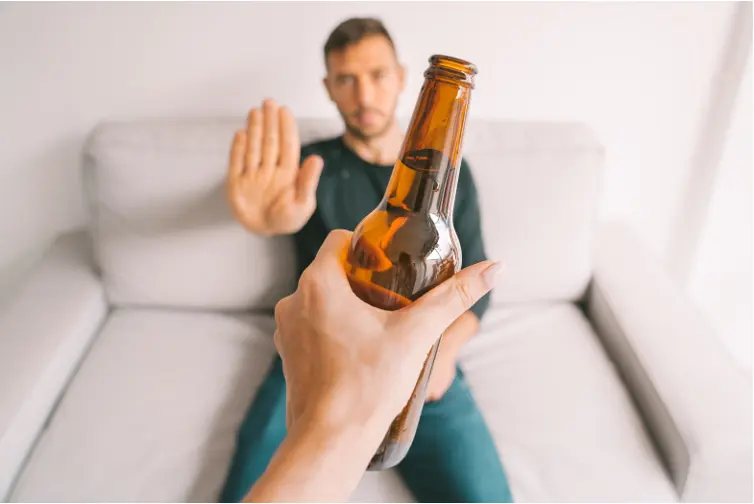With a focus on long-term recovery, drug and alcohol rehab supports individuals in healing from the physical dependence and from the underlying issues that contribute to addiction. Wellbrook Recovery explores the stages of addiction recovery and how individuals can support their loved ones through the rehab process.
What Is Rehab?
Rehab is the treatment process of helping individuals struggling with drug and alcohol abuse to overcome their addiction. It can be dangerous for a person’s physical and mental health to try to quit an addiction by themselves. Medical support is crucial to help them manage their withdrawal symptoms and create positive change. The rehab process aims to help patients successfully achieve long-term sobriety, stable mental health, and general health. Wellbrook Recovery, a trusted leader in rehabilitation, strives to ensure that every patient comprehends and is comfortable with understanding the rehab process.
The most well-known types of rehabilitation are inpatient rehab and outpatient rehab. The process includes an initial assessment, medical detoxification, counseling, and aftercare. Family and friends are encouraged to stay involved and supportive throughout this process, empowering their loved ones along the recovery journey.
Stages of Addiction Recovery
There are four main stages of rehab. Each one has a crucial role in the addiction recovery journey. This includes:
- Intake and assessment: Potential patients are assessed in order to understand their specific situation and the treatment they need. This includes looking at their medical history, mental health, family history, as well as social support.
- Detoxification: This is commonly known as “detox” and refers to where the drugs and alcohol are removed from the body. This includes 24/7 medical care and monitoring to help manage the withdrawal symptoms and any other occurring mental health issues.
- Therapy and counseling: Once the person’s body no longer depends on any substances, psychological and emotional factors can be addressed by a licensed therapist or counselor. This includes various forms of treatment in both one-on-one and group settings.
- Aftercare and support: Once the treatment process is complete, aftercare provides tools such as ongoing therapy to help them integrate into a healthy lifestyle. Constant support is key to achieving long-term sobriety and avoiding relapses.
What is Rehab Like?
There are many types of treatment programs available that are designed to help different addictions and disorders. For example, what they do in a drug rehab and alcohol rehab will be different. The typical day for residential inpatient treatment programs includes a packed schedule of therapy, physical activities, and group discussions and activities. This schedule aims to provide a stress-free and safe space to support the recovery process.

Many rehab centers will begin the day with a healthy breakfast and physical activities such as yoga or meditation. This helps the patient start their day in a relaxed state of mind. The rest of the day consists of therapies, either individually or in a group setting, and different amenities depending on the program. These may include a guest speaker and specialized recreational activities including sports, art and workouts. Healthy meals are provided throughout the day. Patients wind down for the night by journaling, reading, or meditating.
How Does Inpatient Rehab Work?
Inpatient rehab provides a structured environment where patients stay at the center to receive 24/7 medical care and support. This is generally used for people with severe substance abuse issues, co-occurring mental health disorders, or a history of relapses. Running from anywhere between 30 days and 6 months, inpatient programs include a medically assisted detox to manage withdrawal symptoms, one-on-one therapy, and group therapy. This program aims to help patients break away from their addiction and provides the tools to stay sober.
How Does Outpatient Rehab Work?
Outpatient rehab provides addiction treatment services while allowing the patient to stay at home. This is generally used for people whose addictions are less severe and have a strong support system in place. Outpatient rehab can also be used as a transition step for patients going from inpatient rehab back to real life.
Outpatient rehab is typically between 3 to 6 months, although it can extend to a year for more severe cases. With 3-hour treatments, 3-5 days a week, the therapy sessions focus on relapse prevention, counseling, and teaching recovery skills to promote long-term recovery. This flexible schedule allows patients to continue living regularly, balancing therapy with work and social life.
What Happens in Rehab Centers?
Rehabilitation centers offer a range of activities and therapies. These programs aim to support patients and enable them to live a healthy life after rehab.
Common rehab activities and programs that take place in rehab centers offered include:
- Educational workshops: Workshops can provide information on addiction, relapse prevention, and healthy living. Workshops can also be used for the patient's families to educate them on what addiction is and how to be supportive.
- Individual and group therapy: These sessions help patients understand the root of their addiction, develop coping strategies, and build a support network.
- Recreational activities: Art therapy, music therapy, and sports can help patients express themselves, reduce stress, and build healthy habits.
- Holistic therapies: Yoga, meditation, and journaling can help patients achieve mental and physical balance.

A dedicated team of doctors, nurses, psychologists, and licensed therapists plays a crucial role in a successful recovery for both inpatient and outpatient rehab. They provide medical support throughout the process, including detoxification, monitoring patients’ health, prescribing medication as needed, and addressing mental health issues. Working with the patient, they help to set and achieve recovery goals.
How Does Alcohol Rehab Work?
Alcohol rehab programs are designed to help people with alcohol addiction through a combination of medical care, therapy, and support. Starting with a medical detox to safely manage withdrawal symptoms, alcohol rehab looks at the cause of the addiction and develops coping strategies through individual and group therapy sessions.
Drug rehab will typically include a more intensive medical intervention and a broader range of therapies to address the different substances. In contrast, alcohol rehab often focuses more on cognitive behavior therapies and support groups.
How Does Alcohol Rehab Work?
Following detox and recovery, rehab provides the tools to achieve lasting sobriety, including teaching patients healthy coping strategies and relapse prevention. Through workshops and counseling, patients are encouraged to adopt healthier lifestyles, including regular exercise, a balanced diet, and adequate sleep. Rehab programs teach various stress management techniques to help patients handle life’s pressures without resorting to drugs or alcohol.
Rehab programs also teach patients how to identify and manage triggers that may lead to drug use by developing a personalized relapse prevention plan. How does rehab help drug addicts stay sober? Most addiction centers will have aftercare programs and support groups provide continued support and encouragement after leaving rehab and address challenges as they come up.
What To Expect When a Loved One Goes to Rehab?
While the treatment process may vary from program to program as well as from patient to patient, the rehab process includes one-on-one therapy, physical activities, and group discussions. The aim of rehab is for the patient to leave with the tools needed to live a healthy lifestyle by providing a safe and supportive environment where they can heal and recover.
When a patient enters our rehab center at Wellbrook Recovery, we provide a thorough evaluation. This assesses the extent to which their drug usage has affected them – both physically and psychologically. The assessment allows the treatment providers to understand their situation and develop the best treatment plan. Part of this assessment looks at any factors that have contributed to addiction-forming, such as medical history, family history, and mental health status.
Families and friends sending a loved one to rehab can prepare by educating themselves on the recovery process to understand better what their loved one is going through. Being supportive and encouraging is crucial in helping them in the rehab process, continuing to attend therapy, taking part in support group meetings, and finding new and fulfilling hobbies.
Supporting Loved Ones Through the Rehab Process
When supporting a loved one through rehab, it is important to balance providing support and maintaining healthy boundaries. As a family member or friend, being present for your loved one shows that you care. Additionally, sharing words of encouragement and patience during the long recovery journey encourages them to continue their efforts toward a healthy life.

However, it is important to protect your own well-being by setting clear boundaries, including setting limits on financial support and time. Taking care of your own physical and mental health first enables you to continue supporting others. It is recommended to participate in family therapy sessions and support groups. These can provide valuable emotional support, practical advice, and a sense of community from others who understand what you are going through. It also provides a safe space to work through issues together and improve communication to ensure everyone’s goals are aligned.
What We Provide at Wellbrook Recovery:
- Our specialized programs provide evidence-based therapies and compassionate care.
- We offer varied therapies to meet the unique needs of each individual.
- Our care addresses all aspects of addiction, focusing on physical, mental, and emotional health.
- Programs are provided in a structured, supportive environment that removes triggers and substances, aiding the recovery process.
- A diverse range of programs to suit every phase of the recovery journey is provided.
- We offer medical supervision and comfort care to ensure a safe, effective detoxification process.
- Our Group & Family Therapy programs provide a supportive space for families to understand addiction, heal, and strengthen bonds.
- Intervention services are available to help families encourage individuals to seek treatment.
How to Get Support
The rehabilitation process is designed to help individuals overcome addiction and achieve long-term sobriety. From initial assessments and medical detoxification to therapy, counseling, and aftercare, each stage is critical in supporting the recovery process. Inpatient and outpatient programs offer tailored approaches to ensure the best results for every patient.
Wellbrook Recovery provides a safe and supportive environment where patients can heal and grow by providing them with the tools they need to live healthy and fulfilled lives. We encourage family and friends to get involved by participating in family therapy sessions so that they can offer their loved ones emotional support, encouragement, and understanding throughout the process. Your support can make a significant difference in the success of your loved one’s journey to sobriety.
For more information about rehab and how you can support your loved one, contact us. Our team at Wellbrook Recovery is here to provide the guidance and support you need throughout this journey.













